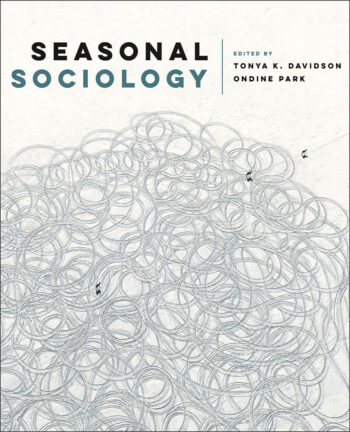by Rafico Ruiz
Davidson, Tonya K., and Ondine Park, eds. Seasonal sociology. University of Toronto Press, 2020.

Air that is too hot. Soil that is too dry. Water that is where it shouldn’t be. Fire that consumes everything. Such are the seasonal characteristics of global warming. It is carbon dioxide coming into contact with the planet’s climatological cycles and wreaking havoc. Tonya K. Davidson and Ondine Park’s Seasonal Sociology (2020) is a collection of approaches that begin to help us think through where social life and changing environments meet, particularly in the settler state of Canada.
The authors offer a compelling and accessible textbook, geared towards undergraduate pedagogy, that affects a provocative and effective set of estrangements from our socialization to weather. A certain pattern of temperature, precipitation, and climate effects that come into contact with categorizations of social life—is this, really, ‘the weather’? A number of chapters in the collection draw attention to the implicit settler colonial orderings of time that get forcibly organized into ‘seasons’ with meaning-laden social constructs. The collection as a whole is organized into four sections, moving from the drop of leaves to a point past the summer solstice (fall, winter, spring, summer). From an examination of fish ontologies and Indigenous place-thought in the wake of the draining of the Rideau Canal in fall (Zoe Todd) to an analysis of the ubiquitous pumpkin spice latte through the lens of seasonal branding (Sonia Bookman). The opening section on autumnal phenomena illustrates a consistency across the collection to read through the taken-for-granted assumptions around the social construction of seasonality within a given cultural context.
For instructors looking to navigate each chapter effectively, the editors and authors have included learning outcomes at the outset of each, with clear and concise paths to follow in order to learn how, for example, gender bias works, as well as other key concepts and terms of social theory. To see Canadian life through the seasons, Davidson and Park show, is to see how it makes manifest questions of land dispossession (in cottage country), social class and demography (summer weddings), and many more ways of being in tune (agricultural time and production) and out of tune (seasonal affective disorder, the relationship between temperature and criminality) with the earth’s natural cycles. While the editors are careful to frame the collection as responding to the human-amplified effects of global warming, the book’s overly neat organizing logic, in sequence from fall to summer, does little to trouble how pervasive the climate crisis has become, and somewhat reifies seasonality as an environmental condition with stable boundaries. It also, of course, in the context of the settler state of Canada, privileges a rather southern Ontario conception of cyclical environmental change (as opposed to, for example, a very distinct diurnal and seasonal cycle across Inuit Nunangat). This is a level of nuance that is near impossible to achieve at the level of the structure of the book, and certainly not in a textbook geared towards the undergraduate classroom, but it does narrow the forms of sociological analysis its conceptual apparatus could suggest. Thinking of social formations through seasonality could also further amplify the voices and practices of Indigenous knowledge holders in the everyday classrooms of undergraduate students. Janet Tamalik McGrath’s The Qaggiq Model: Toward a Theory of Inuktut Knowledge Renewal (2019), makes the point that the qaggiq (a communal igloo) is a structure that can invite in Inuit, other Indigenous communities and Qablunaat in order to co-learn about what it means to live and understand through the land. Seasonal Sociology is a first foray into the forms of normativity upheld and perpetuated through Canadian social and cultural weather patterns. The editors of the textbook demonstrate how these patterns rarely ‘hold,’ but rather are in continuous movement with the structuring conditions of a given society.
